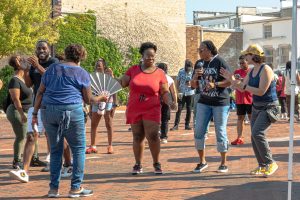Shabazz calls for nonviolent revolution
February 13, 1991
The daughter of Malcolm X told a packed room of about 200 people in Diversions Lounge that each person needs to make a contribution to a revolution.
But Attallah Shabazz said she was not talking about violent revolution.
“You do not have to knock down another man to pick another one up. We are not in a race here,” Shabazz said.
“The word revolution simply means change. It might mean a student getting an ‘A’ for a change. We are all revolutionary in one way or another,” she said.
During her hour-long speech, Shabazz talked about her father a few times briefly. She said while her father was fighting racism, she was learning how “marvelous” black people are.
“They (her parents) planted a seed and continued to water it. Long before I knew about the public Malcolm X, at home I was being warmly enlightened by a man simply called Daddy.
“My father was a parent-friend. You always felt like he was your partner in crime. He believed in trial-and-error to eliminate the peer pressure for approval,” she said.
The audience, which was mostly black, responded with support toward Shabazz’s views and her frequent jokes during the speech.
Shabazz made her views about the war clear when she said people are often manipulated by polls that show more than 70 percent of Americans support the war.
“If someone comes up with a statistic that does not include you, do not surrender to it,” she said. “It is all a part of the manipulation. It happens all the time.
“As we (blacks) may complain, you do not know what it is like to be on the front line. There is not such thing as a win when there is a body count,” Shabazz said.
But during most of her speech, Shabazz asked people to open up to others, including people from other countries. She said she has learned how to say ‘thank you’ in 19 different languages.
“When there is a foreigner in you neighborhood, and we do not look at them eye-to-eye, then he does not feel welcome yet.”
Shabazz said that at one time, blacks were unwelcomed and making foreigners feel unwelcome is the same racism that whites have toward blacks. Many foreigners have experienced more oppression than blacks, she said.
“I take it upon myself to break the ice,” she said. “People hide themselves. Take it upon yourself to open up.”






